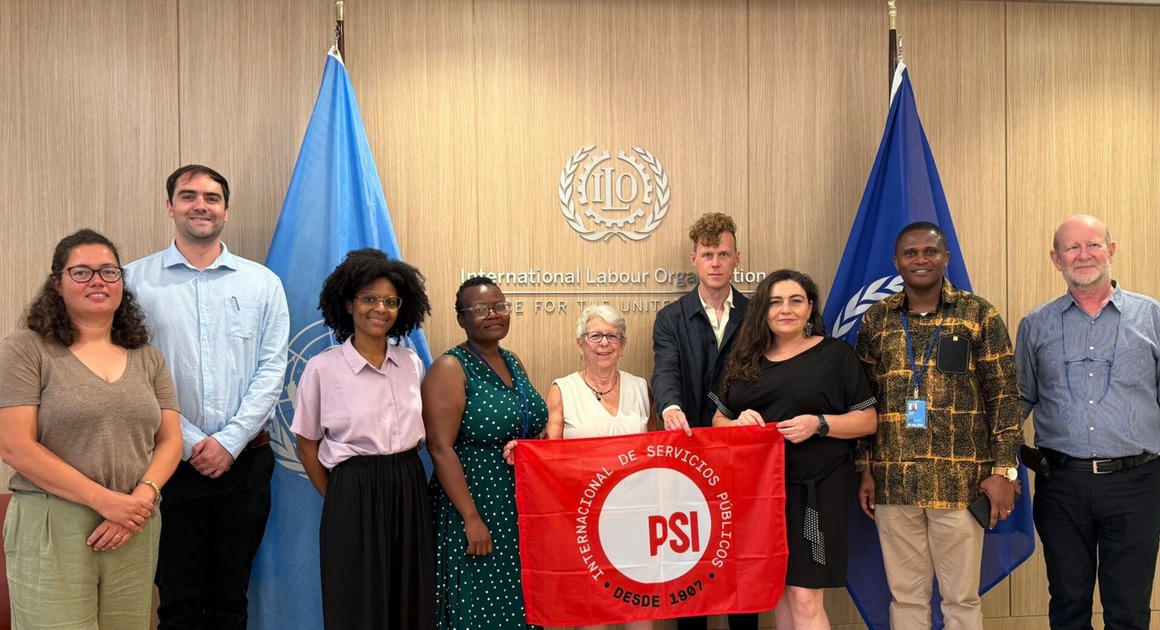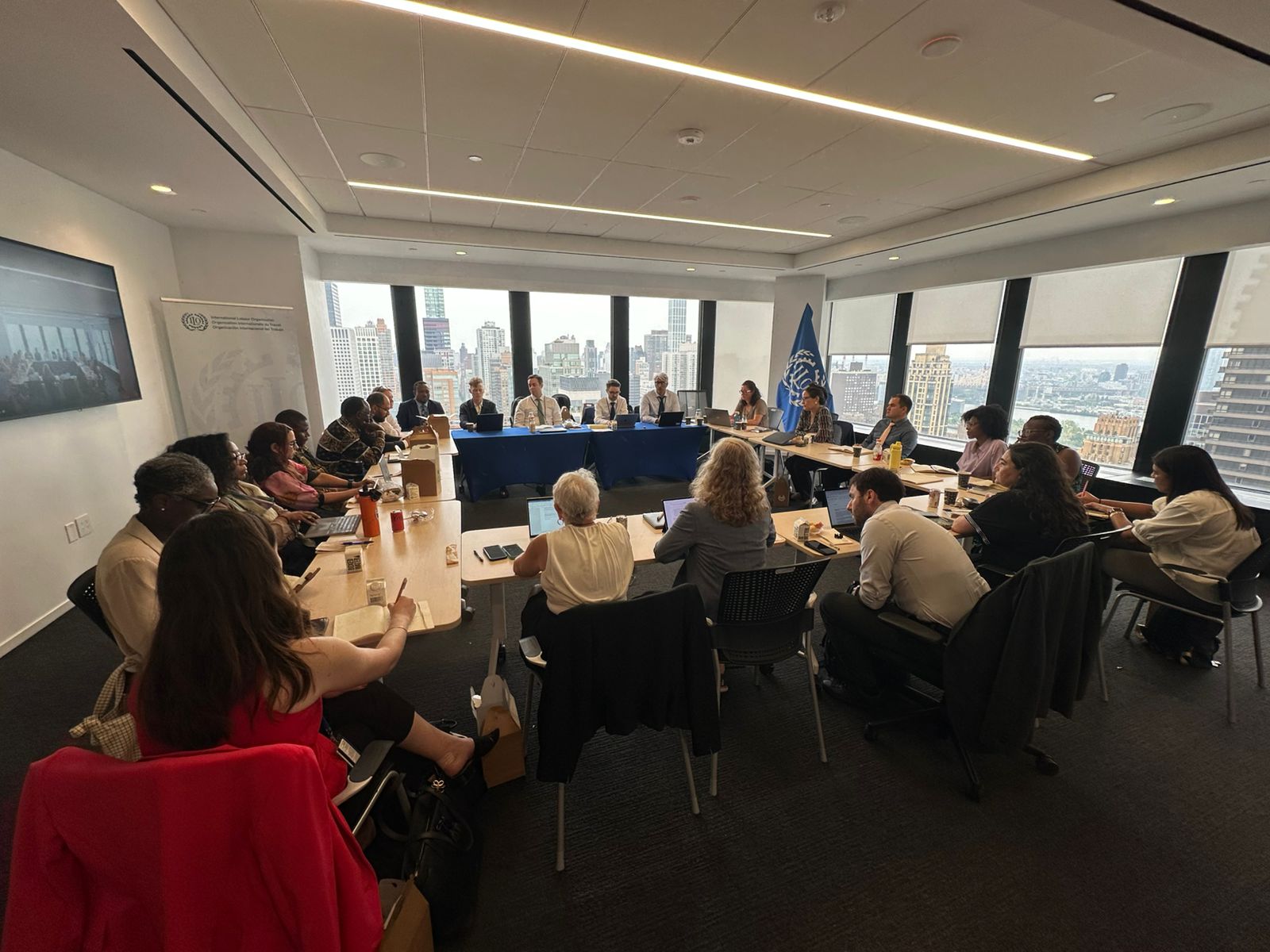Unions push tax justice at the UN
 PSI & ITUC delegates at the UN tax convention talks, New York, August 2025.
PSI & ITUC delegates at the UN tax convention talks, New York, August 2025.The first UN negotiations on a global tax convention took place in New York in August 2025, with unions pressing home that fair taxation is vital to fund jobs, wages, and public services. PSI & ITUC set out priorities to tax multinationals where they operate, keep dispute resolution state-to-state, and ensure full transparency. With talks continuing through 2027, unions will remain active to push for reforms that deliver real outcomes for workers and communities.

Network of Unions for Tax Justice
Negotiations are now underway at the United Nations on a Framework Convention on International Tax Cooperation (FCITC). This process marks a shift from decades of OECD-led rule-making, offering every country an equal seat at the table. The first and second negotiating sessions, held in New York from 4–15 August 2025, confirmed both the stakes and the opportunities for labour. Alongside the negotiations, trade unions also convened with government negotiators in New York to press home a simple message: fair taxation is essential to fund jobs, wages, and public services.
Why the convention matters for workers
Today’s international tax system is not strong enough to prevent aggressive avoidance schemes, allowing powerful multinationals to shift profits to tax havens, even when the real work and value are created somewhere else. The result is lost revenue that should be financing hospitals, schools, and social protection. Workers see the effects daily: fewer nurses, overcrowded classrooms, poorer care in public services. These practices also distort company finances, reducing innovation and investment in the branches and workplaces where real value is generated.
The convention represents a historic chance to replace these broken rules with fairer alternatives.
Global labour's role in New York
On 6 August, PSI, ITUC, and the Network of Unions for Tax Justice (NUTJ) organised a roundtable alongside the negotiations. Union leaders from Ghana, Kenya, Chile, Honduras, Sweden, and the United States met with senior country representatives sitting in the Intergovernmental Negotiating Committee (INC), including the Chair of the process and the co-leads of two major workstreams, as well as with a representative from the European Commission. The exchange was frank and constructive, underscoring that labour’s voice can no longer be sidelined in global tax debates.
Trade unions set out three priorities:
Tax multinationals where economic activity occurs, moving beyond failed transfer pricing rules.
Keep dispute resolution state-to-state only, rejecting investor–state arbitration that undermines democracy.
Ensure full transparency, including mandatory public country-by-country reporting.

Labour was also vocal within the UN negotiations themselves. Representing PSI, Simon Vinge of Akademikerförbundet SSR took the floor during the INC session to stress that true predictability lies in well-funded public services: clean water, decent wages, working hospitals, and schools for all. He urged governments to ensure the convention explicitly recognises the role of tax in financing sustainable development across its economic, social, and environmental pillars.
Where the negotiations stand
For two weeks in New York, open-door negotiations took place between UN Member States, with civil society and trade unions present in the room. Discussions covered three workstreams: the framework convention itself, a first protocol on taxing cross-border services in the digital economy, and options for tax dispute resolution. Taken together with previous public comments on progress so far, the exchanges showed both dividing lines and areas of consensus:
A central split lies between OECD and northern governments on one side, who emphasised avoiding duplication of existing standards and appeared reluctant to put transfer pricing rules into question, and trade unions and civil society, together with some Global South governments, who call for more fundamental shifts such as moving towards a fairer unitary system that taxes multinationals where value and employment are created.
On cross-border services, northern countries tend to insist on physical presence as a condition for taxation, while many Global South countries advocate for significant economic presence (SEP) rules that better reflect today’s digital economy. For unions, the key priority is to secure nexus rules that ensure companies are taxed where their real economic activity, and their workers, are located.
On dispute resolution, several OECD countries signalled willingness to consider binding arbitration between private investors and states, a move strongly rejected by Global South delegates and labour as undermining sovereignty and creating an undemocratic parallel system of justice for corporations.
There is, however, common ground on devising rules that bring benefits to all countries (Global North and Global South), the importance of administrative simplicity (with support for capacity building), and the need to clarify the governance structure of the convention as negotiations progress.
For unions, the heart of the matter is structural: moving beyond this broken system to a fairer unitary approach, treating multinationals as single global entities and taxing them where value and employment are created. In our joint submission to the UN on the issue notes, ITUC and PSI argued for simple, transparent rules that strengthen developing countries’ taxing rights and deliver predictable revenues for public services.
What’s next for labour
The August session was only the beginning. Negotiations will continue in Nairobi in November, with three sessions scheduled per year up to 2027. Trade unions will remain present and actively engaged at each stage, ensuring that workers’ priorities are not sidelined.
As one union leader put it during the roundtable event, lost revenue means fewer nurses, fewer schools, and poorer care. Labour will keep making that case until the convention delivers the reforms workers and communities urgently need.